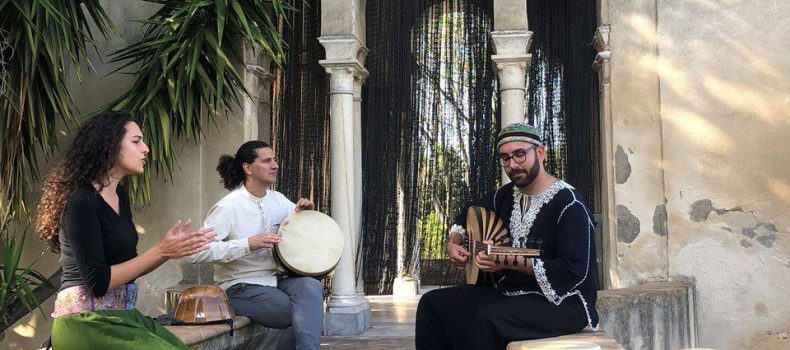The music of the Mediterranean and the Near East is the source from which Christian, Jewish and Muslim artists drank for centuries. Inexhaustible melodies, sensual rhythms and improvisation are combined in the pieces that Izmir plays. Izmir is composed of three interpreters who approach the long melodic and rhythmic tradition of the East, music from the countries of the Mediterranean: Maghrebian songs, Sephardic and classical pieces from Turkey or Egypt, traditional Greek dances and Tunisian love songs. In addition to the voice, the group employs original string and percussion instruments: from the oud or Arab lute and the Greek bouzouki to the Caucasian tambourine and the Egyptian tambourine.
Clara Campos.
He began his musical and singing studies in 2010 completing the lyric singing training at the Professional Conservatory of Music in Seville.
He has sung traditional Mediterranean music, folklore, ancient music, Arabic music, Portuguese fado and is always open to any genre / song that opens the doors of his emotions, allows him to vibrate and grow and with which he feels a direct connection.
He has performed concerts throughout most of Spain, also participating in the most renowned international festivals, Portugal and France.
He was part of the show “Trajano Optimus Princeps” of Producciones Imperdibles, participating in the festival of the Roman theaters of Andalusia (Baelo Claudia), as well as in the Anticuarium of Seville, he has participated in “Endülus muzigui” report about traditional music for the Turkish national tv.
He has recently sung for dance in the show ” Cartas del desasosiego ”, premiered at the Cervantes theater together with Nieves Rosales, Alfredo Lagos, Guillermo Mcgill, Antonio Corrales and Vicente Soto.
Daniel Parejo
Daniel Parejo Martínez is a teacher of music education, musicologist and researcher of medieval musical heritage. He is an interpreter of traditional instruments such as the Arab lute, the bouzouki or the Greek lute.
His interest in the musical heritage of the Al-Ándalus period has led him to specialize in the repertoire of Andalusian, Medieval and Sephardic Christian music, as well as traditional Mediterranean music, including Greek, Arabic, Byzantine and Ottoman music. .
As a result of his research, he has given several lectures on the music of the three cultures, participating in different conferences and conferences of an academic nature, such as the Ketevan World Sacred Music Festival (Goa, India), the First International Symposium of Arabic and Flamenco Music ( Córdoba), the Interdisciplinary Conferences of Andalusian Studies (University of Seville) and the III Folk Music Festival Al Son de la Subbética (Benamejí).
Chiqui García.
He began his studies in Montijo (Badajoz) and later moved to Seville to study classical guitar and then guitar flamenco.
A multifaceted musician, always open to other languages and the tradition of oriental music, which has allowed him to learn string instruments such as bouzouki, saz and classical and popular percussion from the Near East and the Maghreb.
He is a member of the groups Caravasar, Samarcanda, Praça Onze and Nomad trio with whom he has made different recordings and tours in Morocco, France, Portugal and Italy.
He has composed music for the theatrical adaptation Memories of Adriano (La Tarasca). He is a member of the Classic Theater Company of Seville.
He has recently been invited by the Royal Symphony Orchestra of Seville in the ballet “Romeo y Julieta” by Prokofiev as well as the opera “El Barbero de Sevilla”.


























